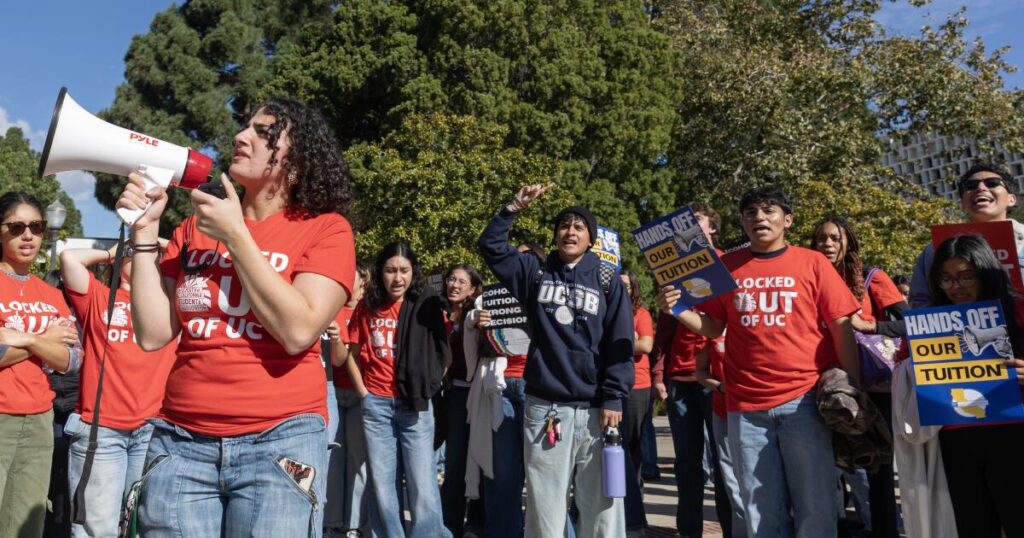Confronting increasing costs and decreasing state and federal funding, the University of California regents on Wednesday approved a tuition hike lauded by UC leaders but fiercely opposed by students.
The board voted to renew a controversial “tuition stability” program adopted five years ago that UC officials say provides long-term predictability for students and parents while bringing in much-needed cash-flow in a time of campus-level deficits, a $130-million cut in state money, hundreds of layoffs this year and uncertainties over Trump administration funding.
The plan caps inflation-based increases at 5% each year and then locks in that rate for the duration of studies for each new entering class. It will also cut the share of tuition revenue that goes toward financial aid by 5%.
“Tuition increases are never welcome, but moderate and predictable increases are necessary to sustain the quality of education that our students deserve,” said UC President James B. Milliken, who expressed his support during remarks at the board meeting on the UCLA’s campus.
Chancellors, he said, “need the tools that we can give them to sustain the quality and the access of the University of California — and that includes, importantly, extending the Tuition Stability Plan.”
But inside and outside the Meyer and Renee Luskin Conference Center where the regents met, hundreds of students — speaking via oral and written public comments and at rally that drew representatives from all nine undergraduate campuses — appeared nearly uniformly opposed.
“I think I speak on behalf of the student body when we say we vehemently oppose this raise in tuition,” said Tommy Contreras, the undergraduate student government’s internal vice president at UCLA. “Historically, the UC has prided itself on being an engine for socioeconomic mobility, and this tuition increase goes directly against that mission.”
They said many students already struggle with debt to pay for classes, books, food and housing in the expensive neighborhoods — including Westwood and Santa Barbara — where most campuses are located.
“Hey hey, ho ho, tuition hikes have go to go!” said a group of student government leaders and supporters gathered outside the building who wore bold-red shirts with the words, “locked out of UC.”
Why UC says tuition must increase
The original tuition stability program, which expires next year, also faced strong opposition. But UC leaders say it has resulted in lower tuition rates when compared to tying costs strictly to inflation. It also still keeps tuition lower than many competing public universities outside of California.
“We recognize that in addressing any tuition issues, we are making decisions that profoundly affect our students and our future students,” said UC board of regents chair Janet Reilly during remarks Wednesday.
But, she said, “as we near the conclusion of fall 2026 application cycle, we clearly see the positive effects this plan has had… Since its implementation in 2022, over half of California undergraduates, about 54%, have received enough aid to fully offset tuition increases and added resources that have helped cover housing, food and books.” About 64% undergraduates, she said, also graduate with no debt.
Leaders said increasing enrollment in the coming years coupled with financial strains — UC recently requested a $130-million zero-interest loan from California to make up for lost state funds — has made the annual increases more urgent.
A UC report compiled over the summer found that instructional spending per student has decreased when compared with levels two decades ago. Student-to-faculty ratios have worsened, and student support programs and faculty salaries have not kept up with university goals — in addition to growing backlogs of deferred campus maintenance.
Under the Trump administration, UC has also faced further financial challenges — $230 million in federal research grants on hold and uncertainty over the $17.5-billion in federal support UC receives each year.
How the tuition program works
Undergraduate students from California who entered in the fall of 2022 — the program’s first year — have paid a steady annual tuition of $13,104. Those who began schooling in later years have paid pay a higher amount tied to inflation and increasing costs.
With the yearly increases — based on the three-year averages of the California Consumer Price Index — each class pays more than the one ahead of it. For undergraduates who entered this fall, the tuition is $14,934 for California residents and $50,328 for nonresidents. Nonresidents include out-of-state and international students.
Housing, food, course materials, supplies, equipment, health insurance, transportation estimates are different at each campus. For UCLA, students living in university housing would pay roughly $28,203 in such fees, totaling $43,137 for California residents before financial aid.
There are a few changes in the new policy.
Tuition increases are tied to inflation rates, and can be lower than the 5% limit — as they have been in recent years. If inflation increases by more than 5% in one year, any percentage above 5% can be banked for use in a tuition increase in a future year. The plan also builds in an additional 1% increase on top of inflation-based hikes to cover capital improvement or other projects.
In addition, the new policy reduces the share of tuition put toward financial aid to 40%, down from the current 45%.
Shawn Brick, UC’s associate vice provost for student financial aid, said in an interview that the change would not reduce UC’s focus on helping lower and middle-income students. Brick said the plan was “not a reduction in financial aid” and that UC would be able to actually better help with “inflationary costs that impact non-tuition educational expenses.”
What the board said
Speaking Wednesday, UC student regent Sonya Brooks said she opposed the plan.
“We have had several increases in student suicides, hospitalizations, basic needs crises… Before we pass a tuition model, can we at least have some sort of an assessment of the campus’s capacity to support student well being and the projected impact of this plan on retention and educational outcomes?” Brooks, who voted against, said.
Brick responded that the tuition plan “generates revenue that can then help to offset those non-tuition costs.” He added that “student debt has actually been declining at the undergraduate level for the last several years. We’re down to about 35%- 36% of [California resident] students graduating with debt … Some of that, I would say, we could certainly attribute to the tuition stability plan.”
Regent Eleni Kounalakis — who voted against — said the increase “really troubles me.”
“Over the course of the last few decades, the concept of who can come to the UC really has changed,” she said. “Tuition when I was a student in the graduate program back in the 90s, I was about $4,500 a year. It’s now $77,000 for that youth that MBA (at UC Berkeley). What happened?… In fact, from 2012 to 2021 we barely increased tuition at all. The increase was only negligible for almost 10 years, and managed to keep tuition down as costs around were rising.”
Regent and Vice Chair Maria Anguiano said she was concerned that “there’s no mechanism for the regents to review this again. And I think good governance really dictates that the regents be periodically reviewing our tuition policy. So I would like to propose an amendment of reviewing this again in seven years.” Anguiano also suggested that campuses be allowed more flexibility in how they use the 1% premium on top inflation-based increases.
Both changes were added as amendments to the final passing vote.
Regent Rich Leib agreed. “I think always talking about tuition at a certain point is good. And I also think some flexibility to campus would be good,” Leib said.
Regent Michael Cohen said he was in support of the plan.
“You know what the price is when your student enrolls, and actually, compared with inflation, you’re getting cheaper year after year — the total dollar amount staying flat from one year to the next,” Cohen said. “But as cost of eggs and groceries and gas go up, your cost for for UCLA or another campus is going down in real terms.”
Regent Ana Matosantos also signaled her support, saying predictability and caps in tuition increases was important.
But, she added, she was “not the biggest fan of the of the change on the return-to-aid side of the equation. I was more interested in the direction of having more of those additional dollars go to other student support, go to housing, go to things that tied to (being) debt-free.”
Regent Lark Park asked UC financial officers on more information on the total education costs. “There are substantial non-tuition costs and sometimes I actually feel like we focus too much on tuition to the expense of discussion about some of these other cost increases that, again, are part of the total cost of attendance.”
Students stand opposed
Speaking at the regents meeting and early morning rally, UCLA students said tuition should remain flat or be evaluated for increases every year, as it did before the tuition stability plan was first adopted.
“It reduces access. It will increase the disparity between extremely low-income students and extremely high-income students, which increases division,” said Arelys Placido, a UCLA student who works for the undergraduate student body government’s office.
Edgar Pedroza Moreno, a first-year student at UC Santa Barbara, said he was against the hike because he had already experienced the high costs of education by having to take out $20,000 in loans for his first year of schooling.
“That’s with financial aid,” said Moreno. “It’s going to be very difficult to pay off.”
“It costs too much to go to college. It’s why I almost didn’t go to Santa Barbara because it was close to impossible to pay unless I got the loans. I’ll have to put myself in significant debt for just one-year of time put toward getting my degree.”
The post Despite student protests, UC regents approve tuition hike amid state, federal funding gaps appeared first on Los Angeles Times.




